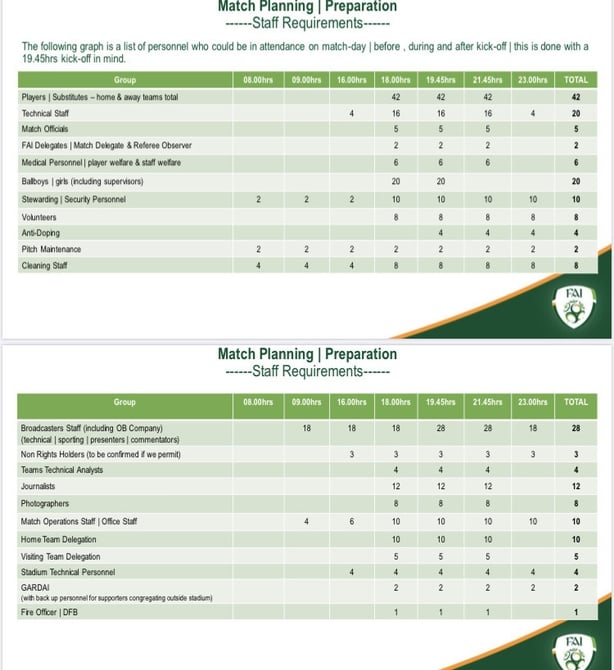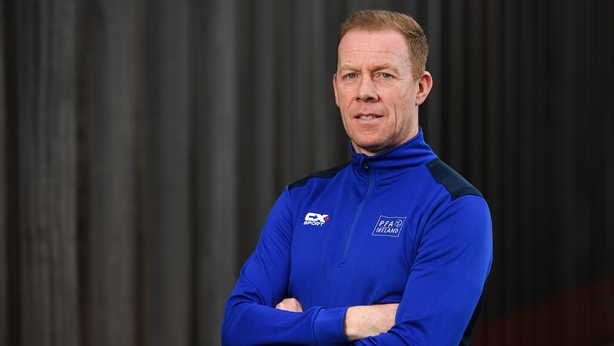A working document has been presented to all SSE Airtricity League clubs proposing that no fans and a maximum of 214 people should be present on match night when football returns.
Regulations include players only being able to train in groups of five during the week, visiting teams travelling in two buses and the phased use of shower facilities post-game.
Players would not be able to take part in contact training or use GPS recorders, and they must wash their own clothing and equipment at home after training.
Deep cleans would be required in match stadiums, clubs would appoint Covid-19 officers to oversee guidelines and training would be delivered to all club staff, as well as being given PPE equipment.
The 214 people present includes all players, staff, club personnel and media. Accreditation must be given for all to attend.
The 42-page document states pitch-side advertising would be the only sponsorship permitted with no corporate guests allowed.
Television and media activity would also come under significant restructuring, with broadcasters signing up to a number of protocols and sign documents to consent.
Player kits and equipment would be washed before and after the game - much of the equipment would be on an individual basis and not shared.
The working document does not given financial projections, including the cost of the measures, as any return to action is still very much in a planning and feasibility study stage.
The working paper was drafted following a video conference between the Football Association of Ireland, the National League Executive Committee and the Professional Footballers Association of Ireland today after the PFAI submitted a high-level paper prepared by their world governing body FIFPRO on protocols around player safety.
Those recommendations have now been incorporated into the FAI's working document, entitled 'Return To Football – Behind Closed Doors’, around best practice for the staging of matches, whenever senior Irish football gets the green light to resume action from the Health Service Executive (HSE).
This document incorporates all elements around the safe staging of games behind closed doors to ensure the health and safety of players, match officials and club employees and volunteers.
All clubs have been asked to assess the document and return their views to the working group.

NLEC chairperson Noel Byrne, who is part of the Shamrock Rovers board, said: "This working document is the next step in assessing what is best for Irish football if the HSE and the Government give the green light for a return to action, but behind closed doors.
"The document is the produce of very fruitful, positive and considered talks between the NLEC, the FAI and the PFAI.
"It is vital that we examine what is needed in the event of games going on in closed stadiums, from a health and safety perspective for all stakeholders and from a financial aspect as far as the clubs are concerned.
"This document, produced by all stakeholders working together, presents options to the clubs and we look forward to their views when they have had a chance to study the document."

PFAI General Secretary Stephen McGuinness said it remains a work in progress: "We welcome the opportunity to be part of this very important debate in these difficult times for Irish football.
"Our players are keen to support the efforts of the FAI and the NLEC to examine a return to football in a manner that is safe for all involved be they players, match officials or club staff.
"The FIFPRO document is a high-level recommendation and the FAI have put together the fine details of what playing behind closed doors looks like for all concerned.
"This is very much a work in progress with all stakeholders working together towards the best solution possible for our game in the event of a closed doors recommendation from the HSE and Government."
The FAI and the NLEC remain committed to looking at alternative income streams for SSE Airtricity League clubs in the event of a return to National League football behind closed doors, with live streaming opportunities under discussion.
Interim Deputy CEO of the FAI, Niall Quinn, said it is a united effort as the financial study continues: "The working document presented to the clubs today offers a real platform for debate about a return to football when we get the go-ahead from Government and health officials.
"They will of course have the final say on when we return and under what circumstances, but it is imperative on us as a working group to present the best options available to our clubs.
"This document offers the clubs an insight into best practice for staging games behind closed doors. The Association also remains committed to exploring the best financial proposition available to our clubs and players at this time.
"Analysis of the financial impact of playing behind doors is well underway with our clubs and we are examining potential revenue streams from live streaming and other sources. This is a united effort and we look forward to further engagement with the NLEC, the PFAI, the referees and the clubs themselves."

